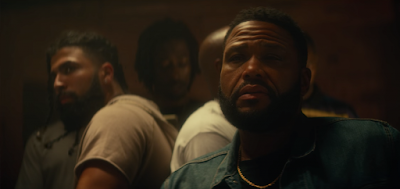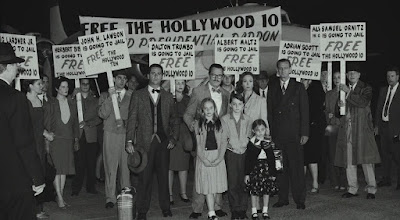Downtown Cincinnati librarians Stuart Goodson and Myra see their regular winter day shaken up when homeless patrons decide to take shelter in their library for the night. What starts as a peaceful sit-in quickly escalates into a face-off with the police and the media.
I wasn't too sure what to make of this film after watching the trailer, but when you see names like Emilio Estevez, Alec Baldwin, Jena Malone, Christian Slater, and Jeffrey Wright on the bill, you hope it would be reasonable. The Public ends up being a surprisingly small-scale humanitarian feat. Directed, produced, and starring Emilio Estevez, you can't help but feel that this is a passion project for him; something that will no doubt have an 'Oscar-worthy' scene thrown in.
The Public is a hostage movie like no other. It seeks to provide some social commentary, looking at the general ineffectiveness of keyboard warriors; that group of people willing to sign petitions, send prayers, or yell obscenities at whoever they see as "guilty" parties online, yet are unwilling to do anything that could cause them the slightest inconvenience.
Really though, the film is about the homeless and focuses on the homeless problem, or more specifically how the homeless are treated by others. That is the true strength of the writing in this film. It fleshes out the characters of homeless people beyond the one-dimensional character that they are always portrayed as, and the one-dimensional character that we see them as in real life on the street. Developing the group of characters does a great job of encouraging empathy with the audience, forcing them to acknowledge the homeless as people, rather than an unsanitary part of the environment.
You can tell that this is Estevez's attempt to highlight injustice in a similar way to what has been done with slavery. Pushing the idea that what is right is not always legal, and what is legal is not always right. Estevez balances on that boundary between eye-opening and preachy and largely does so successfully. Where less care seems to have been taken, was with his treatment of the media and political characters; this is where the film completely lacks subtlety and the characters become unlikeable caricatures, completely wasting the talents of Christian Slater and Gabrielle Union.
The majority of the film takes place within one building, and as far as the cinematography goes, it was nothing too spectacular, but at the same time, you could tell that effort was made to prevent shots from getting too monotonous, taking a number of different perspectives into account. What is quite nice about the characters, is that many lie on different parts of the spectrum; those that abhor the homeless, those that follow the law to the letter, those that used to be homeless, those that used to be addicts, those that want to help but are scared to act, those willing to help, etc. There are a wide variety of perspectives on display.
Surprisingly, The Public is well-paced for a library-based film, that feels quite a bit shorter than its 122-minute runtime. The acting is okay, neither too subtle nor over-the-top (apart from Slater and Union), it simply creates enough empathy that you are willing to wait to see what will hopefully be a happy ending. There is definitely an 'Oscar' moment in the final act but it feels forced; swapping out the obligatory "O Captain! My Captain!" for a sing-a-long.
The standout performance comes from Michael K. Williams who brings so much humanity to the film. Taylor Schilling does a great job with little to work with and is delightfully radiant in her banter, but you can't help but feel that Alec Baldwin phoned in his performance; there was no spark in his eyes.
Regardless, The Public is a test of your humanity. If you are capable of empathy, then there is something to be gained from checking this one out.
In selected cinemas from August 1st, 2019
In selected cinemas from August 1st, 2019







































